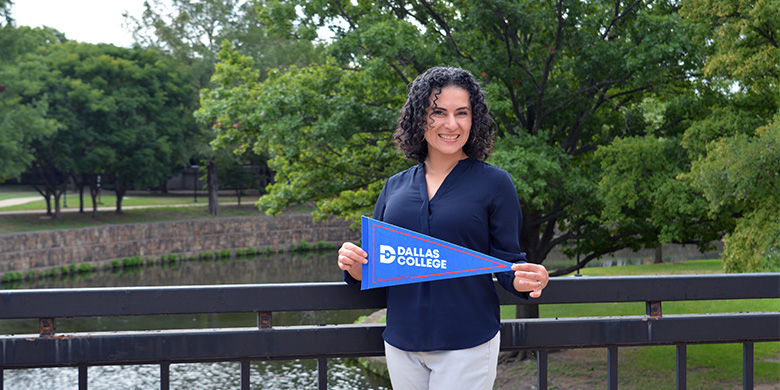Cynthia Alva came to her field in a roundabout way. Alva is a professor of ESOL (English for speakers of other languages) at Dallas College’s Richland Campus and has taught ESOL courses for 13 years.
Originally pre-med at Notre Dame, she discovered a love for service learning, both in the U.S. and abroad. During college, her breaks were spent helping educators teach math in the mountains of El Salvador or working with special ed communities in Chile. Even back at Notre Dame, she tutored athletes and first-year students.
When it came time to apply for medical school, she had a change of heart. Instead of donning scrubs, she applied for an alternative teaching certification and began her career as a Spanish teacher, eventually earning her master’s degree in bilingual education.
She had just had her first child when a colleague who worked at Richland told her they were looking for ESOL faculty. Alva thought it would be a good fit and applied — she’s been teaching students at Dallas College ever since.
“One of the things I love about it is having all different cultures of students in one classroom. It connects to my background in global service learning,” she said.
Helping Students Pursue Their Dreams
In the ESOL classroom at Dallas College you’ll find a wide range of students from all different backgrounds: immigrants who want to develop their language skills for their chosen career or job, international students who need the language skills to continue their studies and students who came to the U.S. in high school, but who haven’t yet reached the level of English proficiency they need.
“We have such a diverse group of students, and I get to help them pursue their dreams,” said Alva. “Part of it is helping them get culturally acclimated to what American higher education is, but it’s also helping them develop the skills needed to excel in their college courses.”
No matter the reason for taking an ESOL class, the end goal is the same for all: “They want to further their education and grow in their career.”
Bringing Diversity, Equity and Inclusion to the Classroom
In addition to her role as instructor, Alva is also passionate about increasing faculty engagement in diversity, equity and inclusion. This is the focus of the research she’s currently conducting for her doctorate in higher education at Southern Methodist University.
“There is very little research on how to increase faculty engagement in DEI. It’s a growing field, especially in higher education, and that faculty piece is so important.”
She began exploring DEI while teaching at El Centro. There, she was a member of the founding cohort of El Centro’s Equity in Education League, which focused on culturally responsive teaching.
Alva explained culturally responsive teaching as “creating a space for learners that is going to meet all of their individual needs and having an inclusive environment that creates equitable outcomes for those students.” She added, “As a professor, I want to drive our profession to do that — especially as we work at a community college with such diverse learners.”
From that cohort, she connected closely with a group of women colleagues, including Vanessa Mercado-Taylor, Mwauna Maxwell and Joselyn Gonzalez. Together, the group worked on facilitating additional training for faculty centered on DEI, including an anti-racism workshop presented at Conference Day 2020 and a racial healing workshop presented last fall.
The end goal for Alva is to apply her Ed.D. research to her work at Dallas College and to help ensure the college’s diverse student population receive the education they need — particularly those for whom ESOL is the first step in their college experience.
“ESOL really is an entry point for so many students. We have a lot of students who need it and who can use it as a pathway to college,” Alva said. “It has the potential to change lives and create opportunities for so many learners.”
